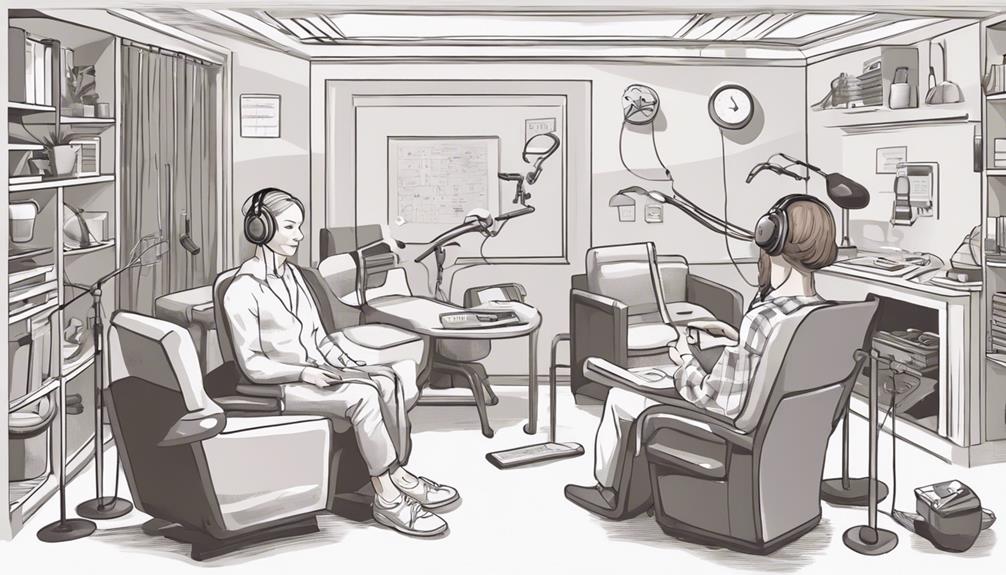As speech-language pathologists, we've all had those moments where a well-timed meme just hits differently. But have you ever come across ones specifically tailored to the quirks of speech therapy?
These 5 hilarious speech therapy memes are not your average internet finds; they're a unique blend of inside jokes and relatable experiences that will leave you chuckling.
So, if you're ready to discover a new side to SLP humor that's guaranteed to bring a smile to your face, then keep scrolling for some much-needed comic relief in your day.
Key Takeaways
- Humorous approach enhances therapy experience and engagement.
- Turning mispronunciations into laughter-filled teaching moments.
- Building connections and resilience through therapist-client humor.
- Celebrating progress and achievements with laughter and positivity.
The Classic Tongue Twister Meme
Delving into the world of speech therapy memes, the Classic Tongue Twister Meme embodies the humorous essence of navigating common speech challenges with a touch of playful wit. This meme offers SLPs and their clients a fun break from the sometimes intense work of speech therapy. Featuring well-known tongue twisters like 'Peter Piper picked a peck of pickled peppers,' it allows everyone involved to laugh at the tongue-twisting struggles that are all too familiar in the world of speech therapy.
SLP Humor is essential in creating a positive and engaging atmosphere during therapy sessions. The Classic Tongue Twister Meme serves as a reminder that speech practice doesn't always have to be serious and intense. It brings a light-hearted approach to working on articulation and phonological skills, making the process more enjoyable for both SLPs and clients. By infusing fun into the learning process, this meme fosters a sense of camaraderie and shared laughter in the journey towards improved speech.
Communication Device Fails

Experiencing communication device fails during speech therapy sessions can present challenges that require patience and technical troubleshooting to address effectively. As SLPs, we understand the importance of clear and uninterrupted communication in therapy sessions. Here are some key points to consider when faced with communication device fails:
- Stay Calm: Remaining composed when a communication device fails can help reduce anxiety for the individual using it.
- Check Settings: Ensure that the communication device settings are appropriate and that any autocorrect features are disabled to prevent unexpected outcomes.
- Encourage Communication: Encouraging the individual to express their thoughts verbally when faced with device issues can help maintain the flow of the session.
- Practice Patience: Patience is crucial when troubleshooting communication device problems. Taking the time to identify and resolve the issue can lead to a more productive therapy session.
Mispronunciation Mishaps
Navigating mispronunciation mishaps in speech therapy sessions can be both challenging and surprisingly humorous. As speech therapists, we often encounter crazy and funny mispronunciations from our clients that bring a light-hearted atmosphere to our sessions. These moments, although stemming from difficulties in articulation or phonological skills, can lead to some truly entertaining exchanges. Witnessing a student struggle to pronounce a word only to end up saying something completely unexpected can spark laughter and create a fun environment for learning.
Helping our clients overcome these mispronunciation mishaps is a core part of our role as SLPs. By addressing these errors with patience and creativity, we turn what could be frustrating moments into valuable teaching opportunities. Sharing these funny anecdotes not only helps us work on improving speech and language skills but also fosters a positive attitude towards speech therapy. Embracing the humor in these situations can make the therapeutic journey more enjoyable for everyone involved.
Therapist Humor at Its Best

In speech therapy, we often find that humor plays a vital role in connecting with our clients and navigating the challenges of our profession. Therapist humor in speech therapy memes captures the essence of the crazy SLP Life, offering a humorous take on the daily experiences we encounter.
These memes not only entertain but also serve as a form of catharsis, allowing us to laugh at the sometimes absurd situations we face in our work. Here are some reasons why therapist humor is essential:
- Building Rapport: Sharing funny memes about our profession helps us bond with colleagues and clients, creating a sense of camaraderie in the SLP Life community.
- Stress Relief: Laughter is a powerful tool for managing stress, and therapist humor allows us to find light in even the most challenging moments.
- Promoting Resilience: Finding humor in difficult situations can foster resilience and a positive mindset, essential qualities for speech therapists.
- Creativity Showcase: These memes exhibit the creativity and wit of speech therapists, highlighting our ability to find humor in the everyday aspects of our work.
Progress Celebrations in Memes
We joyously celebrate the progress made in speech therapy sessions through delightful memes that capture the achievements and milestones in our students' speech development. These memes serve as a testament to the hard work and dedication put forth by both the students and therapists.
They depict the breakthrough moments when a difficult sound is finally mastered or when a new word is spoken clearly for the first time. The humor in these images brings light to the sometimes challenging journey of speech therapy, reminding us to celebrate even the smallest victories along the way.
Life in speech therapy can be filled with ups and downs, but these memes give us a reason to smile and appreciate the progress being made. They give us a break from the intensity of therapy sessions and allow us to reflect on how far our students have come.
Through these memes, we give recognition to the growth and advancements in our students' communication skills, highlighting their determination and resilience.
Frequently Asked Questions
How Does Speech Therapy Help Individuals With Communication Disorders?
Speech therapy helps individuals with communication disorders by providing personalized treatment plans that target specific areas of need. Through exercises, techniques, and strategies, we work to improve speech, language, and overall communication skills.
Our goal is to enhance clarity, fluency, and confidence in communication. By collaborating with clients and their families, we create a supportive environment for progress and growth.
Together, we strive to achieve meaningful and lasting improvements in communication abilities.
What Are Some Common Speech Therapy Techniques Used to Improve Speech and Language Skills?
We often use common speech therapy techniques to enhance speech and language skills. Techniques like articulation therapy focus on improving pronunciations, while language intervention targets vocabulary and sentence structure.
Fluency shaping helps with stuttering, and voice therapy works on vocal quality. Additionally, augmentative and alternative communication methods, such as sign language or communication devices, offer alternative ways to communicate.
These techniques, tailored to each individual's needs, promote effective communication and confidence.
How Can Parents Support Their Child's Speech Therapy Progress at Home?
We believe parents can play a crucial role in supporting their child's speech therapy progress at home. Simple practices like practicing speech exercises together, providing a supportive environment, and celebrating small victories can make a big difference.
Consistency is key, so integrating speech therapy techniques into daily routines can help reinforce learning. By working collaboratively with therapists and staying engaged in the process, parents can positively impact their child's speech development journey.
What Are Some Potential Challenges Individuals May Face During Speech Therapy?
Sometimes, speech therapy can feel like climbing Mount Everest with a toothpick. Challenges may include frustration with slow progress, difficulty mastering new techniques, and feeling self-conscious about speech difficulties.
It's vital to acknowledge these hurdles and work through them with patience and determination. Remember, progress isn't always linear, but every small step forward is a victory worth celebrating.
With support and perseverance, we can overcome these obstacles together.
How Long Does It Typically Take to See Improvement in Speech and Language Skills Through Speech Therapy?
We can see improvement in speech and language skills through speech therapy at varying speeds. Progress depends on factors like the individual's specific needs, consistency in attending sessions, and the complexity of the challenges being addressed.
Typically, some individuals may begin to notice improvements within a few weeks, while others may require several months of therapy to see significant advancement. Every person's journey is unique, and we're here to support and guide them along the way.
Conclusion
In conclusion, these speech therapy memes aren't just hilarious, they're a lifeline for SLPs navigating the ups and downs of their profession.
With exaggerated humor and relatable scenarios, these memes provide a much-needed moment of levity in a challenging field.
They serve as a reminder that laughter truly is the best medicine, helping us to find connection and camaraderie in the shared experiences of our work.
So, let's keep laughing and supporting each other through it all!











